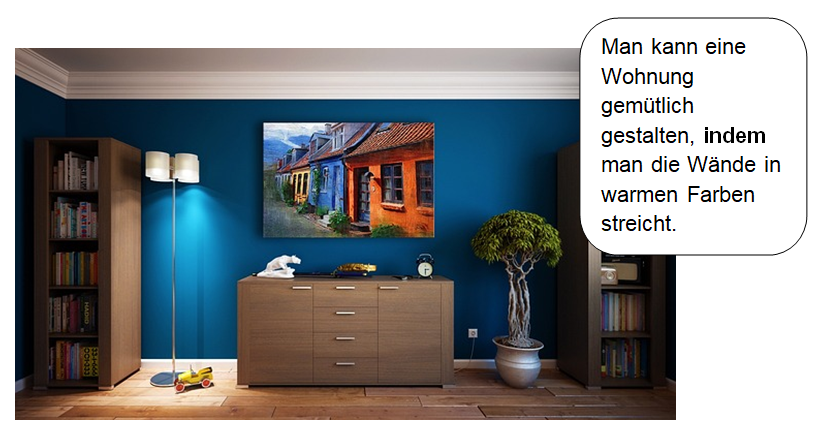In this lesson you will learn all about modal sentences and conjunctions of manner and degree – indem, ohne dass and anstatt dass simply and easily.
Thank you for reading this post, don't forget to subscribe!CONTENTS
What are modal clauses?
Wie/als – Comparative clauses
Indem /dadurch dass
Als ob
ohne dass/ ohne…zu…
(an)statt dass/ (an)statt…zu…
Word order
What are modal clauses?
In German, modal sentences explain how the action in the main sentence happens. These sentences are dependent clauses, so the verb comes at the end. They start with words like “indem,” “dadurch dass,” “wie,” “anstatt dass,” “ohne dass,” and so on. You can also create infinitive constructions using “anstatt … zu” and “ohne … zu.”
Wie/ als – Comparative sentences
We can use modal sentences to show if things are equal or not, depending on the main clause. They’re called comparative sentences or “die Vergleichsätze” in German.
- Equality is expressed with the conjunction wie.
For example:
Im Januar war es (genau) so kalt, wie es im Dezember war.
We can add genau to emphasize the statement. If the verbs are the same in both sentences, then we can shorten the dependent clause.
For exmple:
Im Januar war es (genau) so kalt, wie im Dezember
- Inequality is expressed by the conjunction als. In the main sentence there is an adjective in the comparative.
For exmple:
Er läuft schneller, als ich dachte.
Die Preise sind höher, als sie letzten Monat waren. - Als ob + subjunctive
If we’re making an unrealistic comparison, we use “als ob” or just “als.” When we use “als ob,” we also use the subjunctive. And “so” has to be in the main clause.
For example:
Im Oktober war es so warm, als ob es Sommer wäre.
Im Oktober war es so warm, als wäre es Sommer.
Sie tut so, als ob sie Ärztin wäre.
Keep these rules in mind for word order after using the conjunction ‘als’: When you use only ‘als,’ the verb comes right after it. In sentences with ‘als ob,’ the infinitive verb needs to be at the end of the sentence. We can use ‘als ob’ after certain verbs in the main clause. Here are the verbs that fall into this category:
Er tut so, alsob … (He acts, as if…)
Er sagt das so, als ob … (He says it as if …)
Es/Er sieht so aus, als ob … (It looks as if …)
Es scheint so, als ob … (It seems as if …)
Es hört/fühlt sich so an, als ob … (It sounds/ feels as if …)
Es klingt (mir, uns ..) so, als ob … (It sounds (to me, to us …) as if …)
Indem / dadurch dass
“Indem” is a subordinating conjunction that introduces a clause of manner. In these types of sentences, the verbs always come at the end. The name itself tells us that it’s about how something is done.
For example:
Er verbesserte seine Leistungskapazität, indem er regelmäßig trainierte.
– He improved his performance capacity by training regularly.
Wie verbesserte er seine Leistungskapazität? Indem er regelmäßig trainierte.
How did he improve his performance capacity? By exercising regularly.
Indem can be expressed with a present participle (singing, drawing, walking,…), and it can also be translated as while, by that, so that, so that.
For example:
Du kannst deinen Eltern eine Freude bereiten, indem du sie anrufst. – You can make your parents happy by calling them.
Du kannst mir helfen, indem du den Tisch deckst. – You can help me by setting the table.
We can always ask the question: How can I make my parents happy?
The answer is simple: By calling them.
Or, for example:
How can I help you? – You can help me by setting the table.
There are almost no differences between the conjunctions “dadurch, dass” and “indem”; however, there are some distinctions. Dadurch, dass can be placed at the beginning of a sentence, and “dadurch” is separated from “dass” by a comma.
For example:
Dadurch, dass er regelmäßig trainierte, verbesserte er seine Leistungskapazität. – By training regularly, he improved his performance capacity.
Dadurch can be separated from “dass,” and “dadurch” stands in the main clause, while “dass” is placed at the beginning of the dependent clause. The main sentence then comes first.
For example:
Dadurch, dass man kleine Wohnungen sparsam und hell möbliert, wirken sie größer. – By furnishing small apartments sparingly and brightly, they appear larger.
Kleine Wohnungen wirken dadurch größer, dass man sie sparsam und hell möbliert. – Small apartments appear larger when they are furnished sparingly and brightly.
Als ob
Als ob introduces clauses that express a hypothetical comparison and is the most commonly used equivalent of “as if” in English. It is usually followed by a verb in the subjunctive. Als wenn is less frequent alternative to als ob.
Present time
When the action in the ‘as if’ clause happens at the same time as the action in the main clause, we use the simple past subjunctive.
For example:
Er tat, als ob er ledig wäre. – He acted as if he was/were single.
Sie tat so, als ob sie einen anstrengenden Job hätte. – She acted as if she had a strenuous job.
Past time
When the action in the ‘as if’-clause happens before the action in the main clause, we use the pluperfect subjunctive.
For example:
Sie sah aus, als ob sie gestern schlecht geschlafen hätte. – She looked as if she had slept badly last night.
Er tat, als ob nichts passiert wäre. /He acted as if nothing had happened
Future
When the action in the ‘as if’ clause happens after the action in the main clause, we use the conditional.
For example:
Es sieht so aus, als ob es morgen regnen würde. – It looks as if it is going to rain tomorrow.
Es sah aus, als ob er gleich hinfallen würde. – It looked as if he was about to fall down
Ob can be omitted. Then a finite verb moves into first position, immediately after als.
For example:
Benehmen Sie sich so, als ob Sie zu Hause wären.
Benehmen Sie sich so, als wären Sie zu Hause.
– Behave as if you were at home.
Sie sprechen so gut Deutsch, als ob Sie lange in Deutschland gelebt hätten.
Sie sprechen so gut Deutsch, als hätten Sie lange in Deutschland gelebt.
– You speak German as well as if you had lived in Germany for a long time.
Ohne dass / ohne… zu…
Ohne dass sentence describes the absence of an action that was actually expected. These are also dependent clauses. Verbs come at the end of the sentence.
For example:
Die alte Frau überquert die Straße, ohne dass sie auf den Verkehr achtet.- The old woman crosses the road without paying attention to the traffic.
If the subjects in both sentences are the same ohne dass – clause can be shortened and turned into an infinitive construction: ohne + zu + infinitive
For example:
Er löste eine Matheaufgabe, ohne dass er um Hilfe bat.
Er löste eine Matheaufgabe,ohne um Hilfe zu bitten.
He solved a math problem without asking for help.
(An)statt dass / (an)statt… zu…
A main clause describes an action that takes place instead of or as a substitute for an unfulfilled action in a dependent clause.
For example:
Wir arbeiten die ganze Zeit, (an)statt dass wir ab und zu eine Pause machen.
We work all the time instead of taking a break every now and then.
If the subjects are the same in both sentences, then the (an)statt dass sentence can be shortened and turned into an infinitive construction: (an)statt + zu + infinitive.
For example:
Wir arbeiten die ganze Zeit, (an)statt dass wir ab und zu eine Pause machen.
Wir arbeiten die ganze Zeit, (an)statt ab und zu eine Pause zu machen.
We work all the time instead of taking a break now and then.
Word order
| Main clauses | Dependent clauses |
| Er hat einen neuen Job gefunden, Mein Mann geht nie aus dem Haus, Mein Mann geht nie aus dem Haus, | indem er eine Arbeitsmarkt im Internet benutzt. ohne dass er die Tür dreimal abschließt. ohne die Tür dreimal abzuschließen. |
| Dependent clauses | Main clauses |
| Indem er eine Arbeitsmarkt im Internet benutzt, Ohne dass er die Tür dreimal abschließt, Ohne die Tür dreimal abzuschließen, | hat ereinen neuen Job gefunden. geht mein Mann nie aus dem Haus. geht mein Mannnie aus dem Haus. |
See more:



